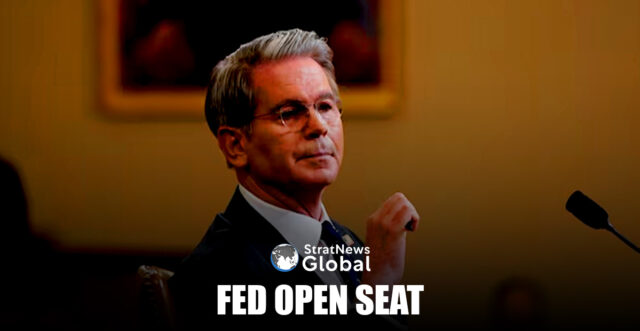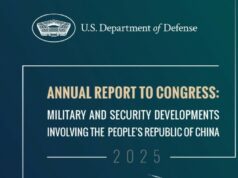President Donald Trump announced on Tuesday that Treasury Secretary Scott Bessent is no longer being considered for an open seat on the Federal Reserve’s Board of Governors (Fed), adding that he will reveal a new nominee “very shortly.”
In an interview with CNBC, Trump said Fed Governor Adriana Kugler’s decision to vacate her seat early was a “pleasant surprise.” The departure of Kugler, whose term would have ended on January 31, appears to have accelerated Trump’s planning for the U.S. central bank, giving him an immediate opening to fill with a person who could also be promoted to the top policymaking role when Fed Chair Jerome Powell‘s term ends in May.
“It’ll be one of four people,” Trump said, adding that he considered both current White House economic adviser Kevin Hassett and former Fed Governor Kevin Warsh as “very good” possibilities. He did not name the other two, but is reportedly considering current Governor Christopher Waller, who has advocated rate cuts but not at the pace or extent Trump wants.
“There are numerous people who are qualified,” Trump said. “I am going to be announcing that very shortly,” the president said in reference to naming a replacement for Kugler, who was appointed to the Fed’s board by former President Joe Biden.
Trump said Bessent would not be in the running for the position because he wants to remain in the top Treasury job.
The nominee would, at least initially, serve the few months remaining in Kugler’s term.
But Trump could be explicit that he plans for that person to then be nominated to a full 14-year term after that time, and to also be his choice to replace Powell when the Fed chief’s term expires next May – giving his nominee several months and several policy meetings to begin to influence the policy debate.
“A lot of people say, when you do that, why don’t you just pick the person who is going to head up the Fed? That’s a possibility too,” Trump said.
The president has been critical of Powell for not cutting interest rates since Trump returned to power in January, and contemplated trying to fire him, even as Fed policymakers balance evidence of both a slowing economy and a weakening job market against the fact that inflation remains well above the central bank’s 2% target and is expected to move higher.
The Fed is charged by Congress to maintain stable prices and maximum employment, and is potentially facing a situation where the two goals conflict with each other – posing a painful set of tradeoffs.
The nominee to fill Kugler’s seat will need to be confirmed by the Senate, and would require another Senate vote for a full 14-year term early next year. The nomination for the next Fed chief would require a separate Senate confirmation process.
‘Another Level Of Problems’
Kugler’s departure was announced the same day that Trump, angered over data that showed job growth slowing in the first months of his administration, fired Bureau of Labour Statistics Commissioner Erika McEntarfer while alleging without evidence that BLS was manipulating the jobs data to make him look bad.
Economists have warned since Trump returned to the White House in January that his combination of import tariffs and erratic trade policy would likely lead to a labour market slowdown and higher inflation, a broadly shared outlook that has been among the factors keeping the Fed from lowering rates until the inflation impact becomes clearer.
The central bank last week held its policy rate steady in the 4.25%-4.50% range, though Waller dissented on the grounds that the inflation risk from tariffs appeared modest at best, while the job market and growth in general seemed to be weakening. The release on Friday of the jobs report for July, with weak monthly employment gains and downward revisions to prior months, appeared to validate those concerns and led to increased market bets the Fed would cut rates at its September 16-17 meeting.
The firing of the BLS commissioner touched off a global wave of concern about the continued integrity of U.S. government data, with Trump’s actions being given a fire-the-messenger interpretation by much of the economics and statistics community.
The president’s choice now to head the statistics agency and potentially to lead the Fed will be scrutinised all the more carefully, said Michael Strain, director of economic policy studies at the conservative American Enterprise Institute.
“Imagine if one of your concerns is that there’s a lackey in charge of the agency and the numbers are fake. That’s … another level of problems,” Strain said of the BLS. “Maybe he sees this independence thing really matters. Maybe he’s got somebody from the outside saying ‘Look, Mr. President, if you appoint somebody who’s perceived to be a lackey as the Fed chair, take the BLS freakout and multiply by 1,000.”
(With inputs from Reuters)





